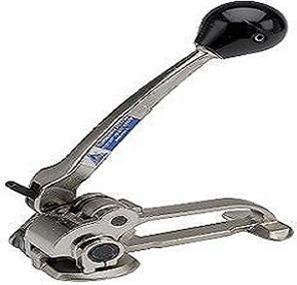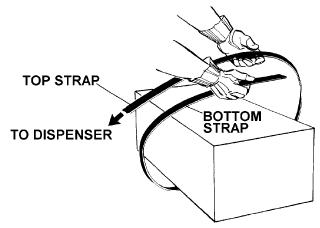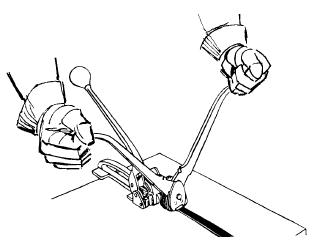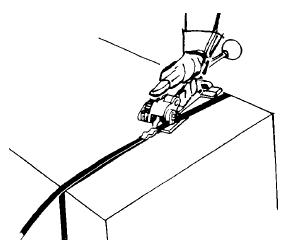.For the prices or for order, please contact your sales representative Kemex.
Operation and Safety manual
DTF-56 MANUAL TENSIONER
GENERAL SAFETY CONSIDERATIONS:
Kemex Strapping Systems 1850, Transcanadienne, ++++.Dorval (Québec) + + ,. Tél: 514-685-1119 +++++ .800-755-3639 ++.Fax: 514-685-2228

1. EYE INJURY HAZARD.
Failure to wear safety glasses with side shields can
result in severe eye injury or blindness. Always wear
safety glasses with side shields which conform to ANSI
Standard Z87.1.
2. STRAP BREAKAGE HAZARD.
Improper operation of the tool or sharp corners on the
load can result in strap breakage during tensioning,
which could result in the following:
. A sudden loss of balance causing you to fall.
. Both tool and strap flying violently towards
your face.
Failure to place the strap properly around the load or on
an unstable or shifted load could result in a sudden loss
of strap tension during tensioning. This could result in
a sudden loss of balance causing you to fall.
Read the tools operating instructions. If the load
corners are sharp use edge protectors. Place the strap
correctly around a properly positioned load.
Positioning yourself in-line with the strap, during
tensioning and sealing, can result in severe personal
injury from flying strap or tool. When tensioning or
sealing, position yourself to one side of the strap and
keep all bystanders away.
3. FALL HAZARD.
Maintaining improper footing and/or balance when
operating the tool can cause you to fall. Do not use the
tool when you are in an awkward position.
4. CUT HAZARD.
Handling strap or sharp parts could result in cut hands
or fingers. Wear protective gloves.
5. TRAINING.
This tool must not be used by persons not properly
trained in their use. Be certain that you receive proper
training from your employer. If you have any questions
contact your Kemex Representative.
6. TOOL CARE.
Take good care of the tool. Inspect and clean it daily,
lubricate it weekly and adjust when necessary. Replace
any worn or broken parts.
7. WORK AREA.
Keep work areas uncluttered and well lighted.
STRAP SPECIFICATIONS
Width: 3/8" to 3/4" Steel
Gauge: Up to .025" Thick
OPERATING INSTRUCTIONS:
1. Encircle the package with strap as illustrated. Take up
the slack, keeping the strap squarely in line.
2. Hold the hand-tensioned strap in position with the left
hand, grasp the tool in the right hand and squeeze the
handle to the base to lift the feedwheel. Position the rear
foot over the strap and slide the front foot under the
overlapping ends, approximately 1" (25mm) ahead of
the lower strap end. Make sure both straps have been
fully inserted into the tool. The inner edges of the strap
must butt up against the inner edge of the tool.
3. Release grip on tool
to engage strapping,
being sure strap is in
alignment with tool.
Tension is obtained through
continuous up and down
motion with the handle.
WARNING:
On downward strokes
do not allow the handle to press against
the base as this will raise the feedwheel
and release the tensioned strap.
4. Snap seal on both layers of strap
directly in front of the tool.
5. Hold the
sealing tool
at a right
angle to the
strap, resting
it squarely
over the seal.
Seal the
tensioned strap
by bringing the
sealer handles
together as far as they will
go.
6. Return the tensioning handle
to rest on the tool, depressing
the handle pawl with your thumb.
Squeeze the handle to the base and
remove the tool from the strap by
swinging the rear foot out as
illustrated.
7. Carefully bend the excess strap sharply back on the
seal. If the excess strap is
loose (not connected to a
dispenser) hold down on the
loose end of strap to prevent
personal injury.
Additional bends will
result in a clean
strap break off.
OPERATING INSTRUCTIONS:
5.
6.






